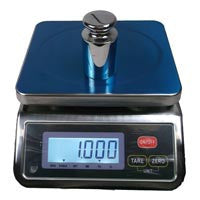Digital scales are a more modern approach to weighing things. They are designed with a display screen that offers to read the weight of objects conveniently. If you are looking for a digital scale, it may be best to consider some factors like the capacity, size and price.
Before looking into these factors, let’s first see how digital scales are different from analog.
Digital vs. Analog Scales
Aside from the electronic screen of a digital scale and the mechanical reads of an analog, they differ in many ways.
Reliability and Accuracy
Both weighing scales offer reliability, but analog scales can be difficult and tricky to read. In essence, digital scales can be more reliable because they are engineered with digital sensors and precision technology. So, a more accurate weight can be read through its LCD.
Durability
Analog scales are designed with simple mechanisms like levers, springs, washers and balances. These traditional parts make them endure even the heaviest capacity, but they are also susceptible to the wear and tear of moisture, rust and loosened springs.
Digital scales, on the other hand, are tailored with high-quality materials, including stainless steel parts making them more durable than analog.
Need to Calibrate
Most digital scales are tailored with an auto-calibration feature and do not require manual adjustments. If your scale does not come with this trait, you may ask your provider for an onsite calibration.
Although analog scales are not automatically calibrated, they are easy to adjust. Simply twist the dial and set it to 0. To ensure that it is working properly, put on some weight for a few seconds and remove it. Make sure that the pointer returns to 0 after removing the weight.
Energy Consumption
Analog scales are not powered by electricity, so you can save on energy and money. Digital scales may source power from electricity or batteries, depending on their type.
Knowing the difference between the two types of weighing scales can help you decide which is more suitable for your needs. You may also check the following factors for the best weighing scale to invest in.

Factors in Choosing the Right Weighing Scale
Application
Essentially, you will have to ask yourself why you need a weighing scale and for what purpose. Knowing its application can help you find the most suitable weighing scale that will cater to your needs. Whether it is for your kitchen essentials or your logistics business, your specifications can help narrow down the many types you can find in the market.
Capacity
After identifying the purpose of your weighing scale, you can now look for the needed capacity, including its division size. It helps to know the minimum and maximum weights of the objects that you will weigh. Remember to include the weight of its container or packaging materials.
Dimensions
When you know the needed capacity of your weighing scale, look for one that has the right size. So, it helps to also know the dimensions of your items like their length, width and height. You should also match the size of your items with the platform of your scale to ensure accuracy.
Accuracy
One of the most important factors that you need to consider when looking for a weighing scale is accuracy. Check with your provider if the scale you are about to purchase has been calibrated and approved for quality trade under the International Organization for Standardization or ISO metrics.
Price
Another important thing to factor out is your budget. Many weighing scales of high quality are also affordable. Before buying a scale, however, make sure that you have checked all its features, including the warranty.
Other Features
Before saying yes to the price of the weighing scale, know and understand its features. This can help you decide whether or not the purchase will be a worthwhile investment. If you are opting for a digital scale, you may want to check on other features that will make it more useful and unique.
First, check the screen display if it remains readable even under direct sunlight. Some LCDs tend to darken when under the sun, hence making it difficult to read. Second, look for digital scales that have automatic on/off switches. There are digital scales that automatically turn on when the item is placed on the platform and turn off after about a minute of being idle.
Lastly, you may also consider digital scales that are Bluetooth-enabled. This feature is one of the most innovative features that can help facilitate data transfer. After weighing an item, the data can be sent to your devices through Bluetooth connectivity.
What are the types of digital weighing scales?
The types of digital weighing scales vary in their capacity and application.
Here are some of the most common digital scales:
- Smart Weighing Scales: These have a compact design and are suitable for lightweight and portable weighing needs.
- Price Computing Scales: They are designed with a built-in thermal label and receipt printer suitable for retailing.
- Platform Scales: These are engineered with ease of use, flexibility and electronic computations. They are best for logistics and other industrial needs.
- Counting Scales: These are state-of-the-art scales that provide precision, time efficiency and reliability. They are highly recommended for inventory and storage data.
- Hanging and Crane Scales: The digital versions of these scales offer more accurate reading with remote-controlled features for your huge weighing needs.
Is there a need to regularly calibrate digital scales?
Generally, it helps to calibrate your weighing scale before use or at least once daily. In most cases, calibrating processes differ on the type or brand. You may check the user’s guide to know how and when to calibrate your digital scales.
Here are some tips on how to effectively calibrate your digital scales:
- Position your scale on a flat surface to make the calibrations more accurate;
- Use calibration test weights to ensure accuracy and precision;
- Place your scale on a gripping pad to help absorb any vibration that can otherwise affect its calibration; and
- Ask your provider for an onsite calibration for bigger scales.
Whether you are weighing the minutest of ingredients or the largest of cargoes, digital scales can be one of the best investments you can make.
Learn more about digital scales, Contact Meltrons Australia today!

